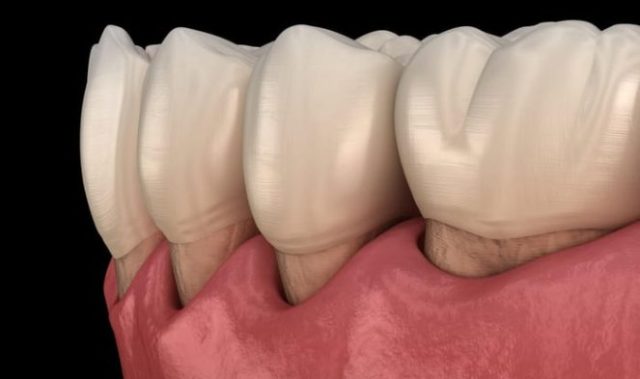Gum recession is a form of dental gum disease (periodontitis) in which gum tissue deteriorates or pulls back from the tooth, exposing more of the tooth and its root surfaces. This is a common dental issue that affects between 4 and 12% of adults. Gum recession often goes unnoticed at first because the process is gradual. If you are looking for Gum Recession Disorder Specialist in Key West FL, we can help you.
However, receding gums are dangerous because they create gaps between the teeth and gum line, allowing bacteria and plaque to build up in the area. When left untreated, bacteria damage the supporting tissue and bone structures of the teeth, potentially causing tooth loss and other health problems.
What are the Signs of Gum Recession?
You may be able to tell you have receding gums by feeling a notch near the gum line. Common signs of gum recession include:
- tooth sensitivity
- a tooth looking longer than usual
- bleeding gums after brushing and flossing
- red and swollen gums
- pain at the gum line
- loose teeth
- bad breath
- visibly shrinking gums
- exposed tooth roots
Gum recession should not be left untreated. If you feel like your gums are receding, make an appointment with a dentist or periodontist for an examination. Dr. Mark I. Gutt is a gums disease dentist Key West, FL, and Miami, FL. Click here to book an appointment with Dr. Gutt if you have any questions or concerns about gum recession.
What Causes Gum Recession?
Many factors can contribute to receding gums, including periodontal diseases, genetics, aggressive tooth brushing, poor dental hygiene, plaque buildup, hormonal changes (especially during pregnancy), smoking, grinding and clenching teeth, crooked or misaligned teeth, HIV, and irritation from oral piercings.
There is also substantial evidence linking gum disease and systemic health conditions. These health conditions include diabetes and heart disease since bacteria from the mouth can travel to the respiratory and gastrointestinal systems.
How Can Gum Recession be Prevented?
The easiest way to reduce your risk of gum recession is to practice good dental hygiene. To do this, make sure to brush and floss twice daily using a soft-bristled toothbrush and visit the dentist or periodontist every 6 months (or more often if a clinician recommends).
You can also use an antibacterial mouthwash once or twice daily. Another important preventative measure is to avoid smoking because it irritates your mouth and increases the risk of developing periodontitis.
Treatment
Receding gums can be treated with just a deep cleaning at the dentist for many patients. However, if it is persistent, you may be prescribed antibiotics, antiseptic chips, antimicrobial mouthwash, or enzyme suppressants. In severe cases, surgery might be necessary.
The three surgical options are flap surgery, gum grafting, and laser treatment or LANAP®. LANAP® is highly recommended because it is the least invasive form of gum surgery with the fastest recovery time. Dr. Gutt offers oral surgery services in Key West, FL, and Miami, FL, including LANAP®. You can contact Dr. Gutt for periodontitis treatment.

